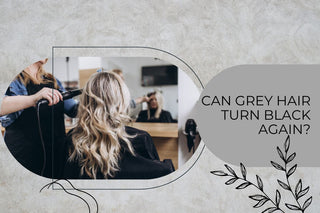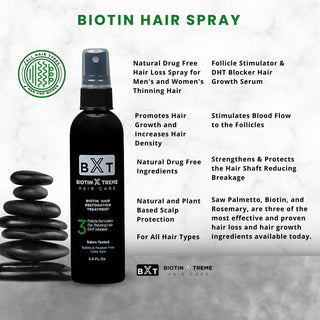Grey hair is a natural and a sign of aging for many people. However, for some, it can be a source of concern and embarrassment. There are many reasons why your hair may turn grey, including genetics, aging, stress, and underlying health issues. While there is no guaranteed way to reverse grey hair, many people have reported success with various remedies that claim to help restore natural pigment to the hair.
Whether you're in your 30s and spotting the first strands of silver or further along the path, the question, "Can grey hair turn black again?"", remains a common one. And it's no wonder—restoring your natural hair color can feel like regaining a part of your identity.
In this blog post, we'll explore some of the most popular ways to turn your grey hair back to black and offer some insights into the science behind them.
Why Does Our Hair Turn Grey? Understanding the Causes
As we age, our hair undergoes a multitude of changes – and one of those is turning grey. Though grey hair is often considered a symbol of wisdom, it can also spark feelings of worry and insecurity in many. But why do our locks lose their natural color, and is there anything we can do to stop it from happening?
Common Causes of Greying Hair
Natural Aging Process
The most common cause of grey hair is simply the natural aging process. As we grow older, the hair follicles begin to produce less pigment, leading to a loss of color. While this can begin as early as our twenties, most people will start to notice grey hairs in their thirties or forties. Unfortunately, there's not much we can do to stop this process – it's a natural and inevitable part of aging.
Genetics
Another leading cause of grey hair is genetics. Just like eye and skin color, hair color is also largely determined by our genes. If your parents or grandparents experienced grey hair at an early age, chances are, you may too. While there's not much we can do to change our genetics, being aware of this factor can help us mentally prepare for the process of greying.
Stress
While it may sound like an old wives' tale, stress can impact the pigmentation of our hair. Research has shown that high levels of stress can lead to an overproduction of hydrogen peroxide in the hair follicles, which can bleach the hair from the inside out and cause it to turn grey prematurely. However, managing stress through relaxation techniques like meditation or exercise may help prevent this from happening.
Poor Diet
A diet lacking in key nutrients like vitamin B12, iron, and folic acid can also contribute to premature greying. These nutrients are essential for hair health, and without them, we may notice our hair turning grey more quickly. To prevent this, make sure to eat a well-balanced diet rich in fruits, vegetables, and lean proteins.
Smoking
Smoking also has a negative impact on our hair health, as it reduces blood flow to the hair follicles and introduces harmful toxins into the body. This can cause premature greying as well as hair loss. Quitting smoking can help improve overall hair health and potentially prevent or slow down the greying process.
While greying hair is a natural and inevitable part of the aging process, there are steps we can take to prevent it from happening prematurely or reduce its impact. Taking care of our bodies through a well-balanced diet, regular exercise, and stress management can help preserve our natural hair color for longer. While we can't control our genetics, being aware of our family history can help us better understand what to expect. By making these simple lifestyle changes, we can keep our hair looking and feeling healthy for years to come.
Can Grey Hair Be Reversed? Science Speaks
Can We Turn Grey Hair to Black?
The short answer is, that reversing grey hair naturally and permanently is not scientifically proven for everyone. That said, certain conditions may temporarily restore pigmentation.
For example, if greying is caused by a vitamin deficiency, stress, or an underlying medical condition, addressing these issues may slow or even partially reverse greying. However, the complete reversal of naturally aged hair remains a challenge.
What Research Tells Us
Studies suggest that boosting hair health and melanin production is possible through a combination of nutrition, supplements, and mindfulness practices. While results vary, improvements in hair strength, texture, and even color vibrancy have been observed in some cases.
How to Turn Grey Hair into Black Permanently Naturally (If Possible)
Natural remedies have long been a go-to for promoting healthier, darker hair. While these methods may not guarantee a full reversal, they can enhance your hair's overall appearance and strength.
- Amla (Indian Gooseberry)
Rich in vitamin C, Amla is a popular remedy for hair health. Consuming it or using hair oils infused with Amla may stimulate melanocyte activity and improve pigmentation.
- Curry Leaves
Curry leaves contain beta-carotene and antioxidants, which support melanin production. Boil curry leaves in coconut oil and apply them to your scalp regularly for best results.
- Coconut Oil & Lemon Juice Mix
Massage a mixture of coconut oil and freshly squeezed lemon juice into your scalp. This remedy nourishes and moisturizes your hair while protecting against build-up that could harm follicles.
- Onion Juice
Rich in catalase, an enzyme believed to reduce hydrogen peroxide build-up in hair (a factor in greying), onion juice might promote healthier pigmentation.
- Herbal Hair Masks
DIY masks using natural ingredients like hibiscus, fenugreek, or henna can strengthen hair and give it a natural boost of color.
Note
Natural remedies require patience and consistency. It's essential to pair them with a healthy lifestyle for long-term results.
Can White Hair Turn Black Again? Nutrition and Supplements Matter
The path to healthy hair starts from within. Enhancing your diet with nutrient-rich foods can work wonders for hair pigmentation.
Key Nutrients for Hair Pigmentation
- Biotin (Vitamin B7): Essential for keratin production and and strengthening hair follicles.
- Vitamin B12 & Vitamin D: Support melanin production and overall scalp health.
- Zinc, Iron, and Copper: Crucial minerals that maintain melanin levels and prevent premature greying.
Actionable Tips
- Incorporate foods like spinach, eggs, nuts, and citrus fruits.
- Consider supplements like Biotin Xtreme Hair Care, which nourishes the scalp and promotes healthy hair growth.
Other Solutions for Managing Grey Hair
While reversing grey hair naturally can take time (with no guaranteed results), there are other ways to manage it effectively.
Alternative Recommendations
- Natural Dyes: Semi-permanent organic dyes can mask greys without harming your hair.
- Salon Treatments: Professional coloring techniques ensure even coverage and long-lasting results.
- Sulfate- and Paraben-Free Products: Biotin Xtreme Hair Care products are gentle on sensitive hair while promoting growth and vibrancy. Natural hair care products are made with natural, non-toxic ingredients that provide deep nourishment to the hair and scalp. Biotin shampoo, for example, contains biotin, a B vitamin that helps in the synthesis of amino acids that form keratin. This strengthens hair strands, reduces breakage, and promotes hair growth.
Preventative Measures
- Minimize stress by using meditation or exercise.
- Avoid harsh shampoos that weaken your hair.
- Reduce DHT production, a common factor in hair thinning, with targeted treatments like Biotin Xtreme Restoration Spray.
-
Avoid Harsh Chemicals: Excessive use of chemicals, such as hair dyes that contain ammonia and peroxide, can cause severe damage to hair. It can lead to dryness, breakage, split ends, and premature graying. So, it's best to use chemical-free hair products that are gentle on hair and scalp.
Building a Healthy Hair Care Routine
Creating a sustainable routine is critical to supporting healthy growth, preventing further greying, and maintaining your current color.
Suggested Steps:
- Use Biotin Xtreme Shampoo and Conditioner to cleanse and nourish your hair without harsh chemicals.
- Apply the Biotin Hair Restoration Spray to stimulate follicles and reduce DHT.
- Avoid heat styling tools, focus on scalp massages, and opt for satin pillowcases to reduce breakage.
Finding Balance with Realistic Expectations
While reversing grey hair entirely may not be feasible for everyone, the good news is that you can slow down the process, manage your greys, and promote healthier locks. Alternatively, many individuals today are proudly embracing their silver strands as a symbol of wisdom and confidence.
Remember, the goal is not perfection but progress. Healthy, well-maintained hair—whether black, brown, or grey—can help you look and feel your best.
Do Gray Hairs Have to be Inevitable? Tips on Preventing Premature Gray Hair
Fortunately, there are ways to slow down this process or even prevent it from happening altogether.
As we age, gray hairs tend to make their inevitable appearance. However, is it inevitable? Many factors contribute to premature graying, including stress, genetics, and even poor nutrition. While some of these factors cannot be controlled, some steps can be taken to prevent or slow down the graying process. Regular exercise, a balanced diet, and avoiding smoking and excessive alcohol consumption can all contribute to overall hair health. Additionally, minimizing stress through relaxation techniques or therapy can also help slow down the graying process. With a little effort, it may be possible to keep those gray hairs at bay for a little while longer.
In conclusion, there are many ways in which you can try to reverse grey hair or at least slow down the process. However, it's important to remember that there's no sure-fire way to do so, and results may vary. Hence, it is best to take a holistic approach by incorporating healthy lifestyle choices and asking for professional help before trying out any treatments. At the end of the day, embracing yourself and your natural hair is far more important than hiding or reversing greys. Remember that grey hair is a normal part of aging, and it can be a beautiful one, too.
Grey Hair Solutions, from natural remedies to expert-curated hair care routines, offers a blend of scientific and holistic approaches to managing greying hair. Start by enriching your diet, incorporating natural treatments like amla and onion juice, and leveraging expert products like Biotin Xtreme Hair Care to maintain scalp health and vibrant hair color.






